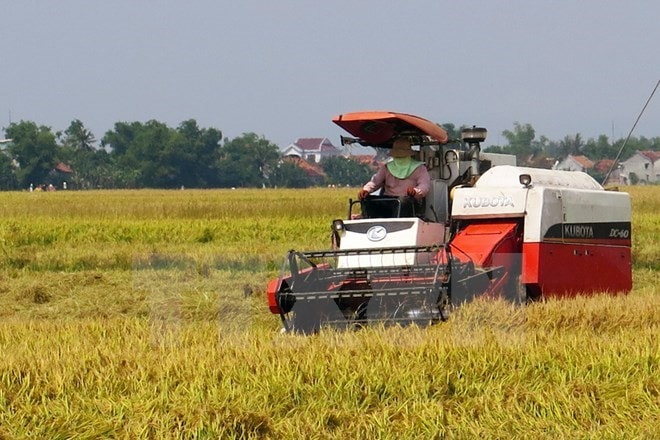Developing agricultural value chains in the Mekong sub-region
Developing agricultural value chains in the Mekong Sub-region was the topic discussed by delegates at the "National Policy Dialogue Forum" organized by the Ministry of Industry and Trade on December 14 in Hanoi.
Referring to this issue, Deputy Minister of Industry and Trade Tran Quoc Khanh emphasized that agriculture plays an important role in growth to meet the increasing demand of domestic and foreign consumers for high-quality food.
 |
| Farmers harvest winter-spring rice. |
In the Mekong sub-region, agricultural labor accounts for 32%-70% of the total labor force, but contributes only about 11%-30% to GDP. Although the connection between producers and domestic and international markets has not been fully exploited, the Mekong sub-region is still an area with potential for agricultural development, in terms of output and added value, contributing to economic growth.
According to Deputy Minister Tran Quoc Khanh, ASEAN continues to focus on developing the agricultural sector to prepare for the formation of the ASEAN Economic Community (AEC) and build a single market in the region.
Through ASEAN Good Agricultural Practices (GAP), food quality as well as worker health and safety are given top priority. At the same time, product quality becomes a prerequisite as consumers increasingly place importance on health protection and are aware of the impact of food on health.
However, farmers still face difficulties in ensuring good quality of their products. Value-added agriculture needs to respond to the government and consumer concerns about food safety.
Professor Sisira Jayasurya - Director of the Center for Development and Sustainable Economics said that the Mekong Sub-region has many conditions for agricultural development such as land, water resources, climate and people. This region is also located next to large markets such as China, Japan and countries in the Southeast Asian region. The problem is to take advantage of those advantages for development.
According to Mr. Sisira Jayasurya, Vietnam needs to improve the quality and competitiveness of agricultural products. However, to meet the standards required by import markets, the Government must support and have policies on building infrastructure to help small-scale farmers link with large enterprises to achieve maximum benefits.
At the workshop, domestic and international delegates also shared about how transformations and changes in the regional and global economy, along with pressure on scarce resources, are opening up enormous opportunities along with challenges and risks for the agricultural sector in the Mekong Sub-region.
Dr. Vo Tri Thanh - Director of the Central Institute for Economic Management and Research shared that the new agriculture needs to ensure 3 factors. First is the advantage of scale to absorb capital and technology. Second is to connect all relevant parties in the agricultural production and supply chain, starting from seeds to domestic and foreign markets. Third is to connect with social issues, culture, regional characteristics of Vietnamese people, Vietnamese ethnicity and Vietnamese way of life, for example, community spirit.
According to Mr. Vo Tri Thanh, the Mekong sub-region is a strategically located area, passing through rapidly growing markets. This advantage will contribute to job creation through increased production and improved processing of vegetables and fruits for export.
To achieve this, the production, processing, packaging and distribution processes need to be modernized and innovated. On the way to a dynamic, high-value and sustainable agricultural sector in the region, a number of issues need to be focused on and addressed, such as prioritizing infrastructure to connect producers with export and domestic markets; strengthening agricultural supply chains and empowering small-scale producers.
According to Vietnamplus
